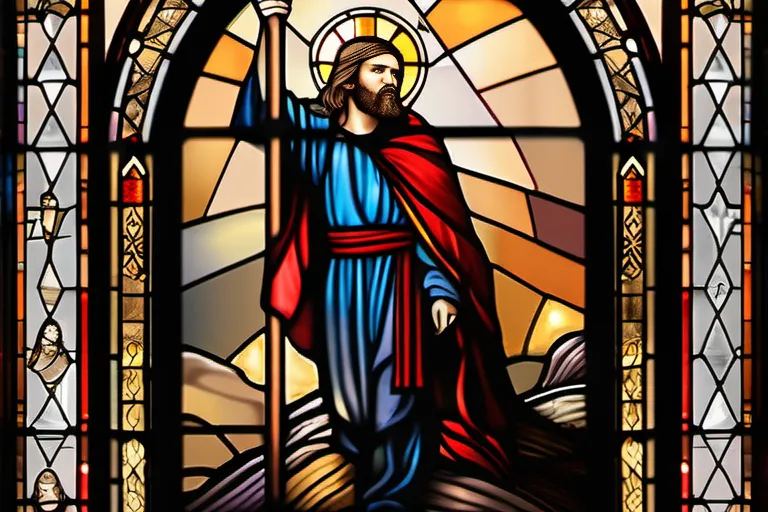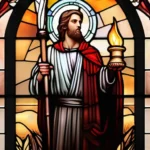Explore the significance, history, and impact of martyrdom on Christianity.
Martyrdom is a central concept in Christianity, representing the ultimate sacrifice made by followers of Jesus Christ. In this article, we delve into the meaning of martyrdom, its origins, and its role throughout Christian history.
The Origins of Martyrdom
The origins of martyrdom in Christianity are deeply rooted, reflecting the very essence of faith and sacrifice. Imagine a seed planted in the fertile ground of early Christian communities, where persecution was as common as the sun’s rays. How did this seed grow into such profound significance? Let’s delve into its beginnings.
During the reign of Emperor Nero, Christians faced severe persecution, which marked one of the earliest instances of martyrdom in recorded history. But why did these early believers choose to embrace death rather than renounce their faith? Was it a simple act of defiance or something more profound?
Martyrdom during this period was not just about enduring torture; it was a declaration of unwavering love for the One True God. The early Christians saw martyrdom as a continuation of Jesus’s own sacrifice, a path to ultimate salvation. They believed that through death, they could offer a pure and unaltered form of worship, free from the corrupting influences of paganism.
The stories of these martyrs became legends, passed down through generations, inspiring others with their courage and faith. Their lives were not just tales of sacrifice but metaphors for enduring love and loyalty in the face of adversity. How could anyone look at these examples without feeling a surge of admiration and awe?
As we trace the roots of martyrdom in Christianity, it is clear that its significance lies far beyond the physical act of dying. It represents a spiritual journey towards eternal life, where the soul finds freedom from earthly constraints and embraces the promise of immortality.
Through these early experiences, martyrdom became more than just a historical event; it became a foundational pillar upon which the Christian faith was built. The stories of those who gave their lives for their beliefs continue to resonate through time, reminding us that the true essence of Christianity is found in acts of love and sacrifice.
How can we possibly fathom such profound dedication? What drives someone to choose death over renunciation? These questions echo through the ages, challenging our own understanding of faith and commitment. The origins of martyrdom are not just about history; they are a timeless testament to the power of belief.
Defining Martyrdom
Martyrdom, as it pertains to Christianity, often evokes images of sacrifice and unwavering faith. But what exactly does it mean? Is martyrdom merely a tragic end or a profound expression of one’s commitment to their beliefs?
At its core, martyrdom in Christianity can be seen as the ultimate act of self-sacrifice, where individuals willingly give up their lives for their faith. This concept is rooted deeply within Christian theology, with roots stretching back to the earliest days of the church.
The idea that a martyr’s death is not only an end but also a beginning, symbolizing eternal life and the triumph of Christ over death, adds another layer of significance. Think about it—how can someone truly die if their sacrifice brings them closer to God?
Love and sacrifice are central themes in defining martyrdom. It’s not just about enduring pain or suffering; it’s about embodying a love so profound that one chooses to give up everything, even life itself, for the sake of spreading The Word. This act of selfless giving challenges us to ask: How much do we really value our own lives?
Martyrdom in Christianity is also seen as a form of witness. By enduring persecution or death, martyrs often inspire others and reinforce the faith. The stories of these heroes remind us that the path to Christ can be fraught with trials and tribulations.
Moreover, martyrdom serves as a powerful tool for theological debate, questioning the very nature of faith and sacrifice. It forces us to confront difficult questions: What does it mean to truly believe? How far are we willing to go in defending our convictions?
In essence, martyrdom is not just about dying; it’s about living out one’s faith with such intensity that even death becomes a continuation of the same. This concept invites us all to consider how deeply we can immerse ourselves in our beliefs and what lengths we might be willing to go for them.
Martyrs in Christian History
Martyrs in Christian History: Examine notable examples of martyrs throughout Christian history, highlighting their stories and the impact they had on the faith.
Have you ever wondered how those early believers found the strength to face death rather than renounce their beliefs? The stories of martyrs like Polycarp and Perpetua are not just tales of bravery; they are powerful testimonies to the unyielding spirit of faith. In a world where persecution was rampant, these individuals chose to stand firm, knowing that their sacrifice could inspire countless others.
Consider the story of Polykarp, a bishop known for his unwavering commitment to Christ. As he faced execution by wild beasts in the arena, his last words were reportedly “Fourscore and six years I have served my Lord and God; and He has never done me any wrong.” These words echo through time, reminding us of the deep roots of Christian faith that some are willing to die for. The lion’s den was not just a place of death but also a symbol of how faith can triumph even in the most challenging circumstances.
Another compelling narrative is that of Perpetua, a young mother who faced untold suffering before her martyrdom. Her diary offers a poignant glimpse into the inner struggles and eventual resolve that many martyrs experienced. By chronicling her thoughts, Perpetua provided a personal account of courage under duress, showing how faith can sustain even in the darkest moments.
Martyrdom is not just about the sacrifice but also about the legacy left behind. These early Christian martyrs laid down their lives for a belief that became the cornerstone of the Church. Their stories continue to inspire and challenge believers today, reminding us that the path of faith can sometimes lead to profound personal trials.
As we reflect on these historical figures, it’s hard not to wonder how our own convictions would be tested in such extreme circumstances. The stories of martyrs serve as a reminder that true faith is more than just words—it’s an action that demands courage and sacrifice.
The Role of Martyrdom Today
How does martyrdom play out in today’s world? In an age where technology connects us like never before, and social issues are debated on platforms worldwide, one wonders if the concept of a martyr still holds its weight. Is martyrdom just a relic of the past, or is it still a powerful force that inspires believers to stand firm in their faith?
Let’s consider the role of martyrdom today. While the physical acts of persecution and execution have lessened in some parts of the world, the spirit of martyrdom continues to inspire Christians globally. Think about it: if a single individual can face unimaginable suffering for their beliefs, how much more are we called to live our faith daily?
Martyrdom today often manifests through small acts of sacrifice and witness. A teacher who stands up against injustice, a nurse who works tirelessly in war-torn regions, or even a community member who refuses to compromise on moral principles—these are modern-day martyrs. They may not face the same physical danger as their historical counterparts, but their courage and dedication can be just as profound.
Moreover, martyrdom serves as a reminder of our shared humanity and the importance of standing up for what is right. In a world often divided by politics and personal gain, the story of martyrs unites believers across denominations and geographical boundaries. Their stories inspire us to look beyond the noise and find common ground in our faith.
So, how can we embrace this legacy? By living out our faith with integrity and by sharing our beliefs without fear or hesitation. Martyrdom isn’t just about enduring persecution; it’s also about living a life that reflects the values of love, compassion, and resilience. As Christians today, we have the opportunity to be modern martyrs—inspiring others through our actions and witness.
Ultimately, martyrdom remains as relevant today as it ever was. It challenges us to be courageous, to stand firm in our beliefs, and to make a difference in the world around us. By understanding its role in our lives, we can find strength and purpose in serving God.
Martyrdom and Christian Values
Martyrdom in Christianity is like a beacon, illuminating the path of love and faith in the darkest of times. Have you ever wondered why love, faith, and sacrifice are so central to the Christian story? These values shine brightest when they are tested, and martyrdom is perhaps the ultimate test of these virtues.
Saints like Polycarp and Ignatius of Antioch exemplify how love can transcend even the most brutal forms of persecution. Imagine being faced with such an intense trial—would you still hold onto your love for Christ? In their final moments, these early Christians chose to embrace their faith, demonstrating that true love is not just about feeling; it’s also about willing sacrifice.
Faith, in this context, isn’t merely a belief but a way of life. It requires courage and conviction, especially when facing unimaginable hardships. The stories of these martyrs remind us that our faith is meant to be lived out through actions, not just professed with words.
Sacrifice, too, takes on new dimensions in the context of martyrdom. It’s not merely giving up something tangible but offering oneself completely for a greater cause. For these early Christians, it was about serving their Lord and Savior, even if that meant enduring physical pain and suffering.
But why are these values so crucial today? In our modern world, where technology and convenience often overshadow genuine human interaction and faith, martyrdom serves as a powerful reminder of the cost of commitment. It challenges us to ask ourselves: how much are we willing to sacrifice for what we believe in?
Martyrdom isn’t just about past figures; it’s a living legacy that continues to inspire Christians worldwide. By understanding the significance of these sacrifices, we can better grasp the essence of Christian values and apply them meaningfully in our lives today.
The Legacy of Martyrdom
The legacy of martyrdom in Christianity is like a beacon, guiding believers through the darkest chapters of their faith. How many times have we wondered, ‘What would it take for us to stand firm in our beliefs?’ Martyrdom isn’t just about sacrifice; it’s a profound statement of commitment and devotion. Can you imagine what life might be like without the stories of early Christian martyrs? These heroes, whose names are now whispered with reverence, played an indispensable role in shaping Christianity as we know it today.
The stories of those who faced persecution and ultimately gave their lives for their faith serve as a living testament to the power of spiritual conviction. They remind us that true faith is not just about believing, but about acting on one’s beliefs, even when the world turns against them. Think about it: if early Christians hadn’t stood firm in their values during times of severe persecution, would we still be celebrating Christmas and Easter today? These holidays are deeply rooted in the stories of martyrs like Peter, Paul, and countless others who faced death rather than renounce their faith.
Martyrdom has inspired generations to follow. It’s a call to action, urging believers to live with courage and integrity. Consider how many modern-day Christians draw strength from the example of martyrs. Their stories have become a source of inspiration, fueling the spiritual fires that keep faith alive in challenging times. We often ask ourselves, ‘How can I make a difference in the world?’ The legacy of martyrdom provides an answer: by standing up for what is right, even when it means facing adversity.
The impact of these brave souls extends beyond their own time. Their sacrifices have paved the way for freedom of religion and the continued spread of Christianity around the globe. Martyrdom has served as a litmus test for faith, pushing believers to deepen their commitment and understanding. As we look back on history, we see that martyrdom is not just about personal sacrifice; it’s also about inspiring others to find courage in their own lives.
In the end, the legacy of martyrdom lies in its ability to transform individuals and communities. It challenges us to ask difficult questions and face our fears head-on. By studying these stories, we gain a deeper appreciation for the values that define Christianity—love, faith, and sacrifice. The enduring impact of martyrdom is not just historical; it’s a vital part of the ongoing journey of faith in the modern world.
Conclusion
 By understanding the profound impact of martyrdom on Christianity, we gain insight into the faith’s resilience and the enduring power of love and sacrifice.
By understanding the profound impact of martyrdom on Christianity, we gain insight into the faith’s resilience and the enduring power of love and sacrifice.











